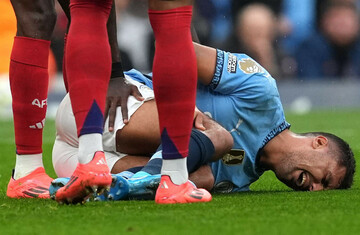EVERYTHING SEEMED to change after Man City’s last meeting with Arsenal.
It will almost certainly be the game that goes some way towards explaining and defining their season.
It is not inconceivable that in years to come, the match might become widely perceived as the beginning of the end of the Pep Guardiola era.
Certainly, it seems to have been the end of the City team the Catalan coach had spent years building.
After arriving in English football in 2016, it didn’t take long for Guardiola to turn City into the Premier League’s dominant side.
In his eight seasons before this one, only two have ended without the league title. Their lowest points tally, 78, occurred in Guardiola’s first campaign at the club and they have consistently racked up 80-plus points since.
In four of the eight campaigns, they have achieved 90-plus points, along with Liverpool, normalising a feat, which was extremely rare before Guardiola’s tenure.
Backed by considerable and allegedly illegal financial might, their peak was arguably the 2022-23 campaign when City secured a historic treble.
It initially appeared to be business as usual this season.
The Etihad outfit were strong favourites to claim a fifth successive league title and winning all four of their opening games reinforced this view.
Then, on 22 September, City hosted an Arsenal side who had come closest to ending their dominance in the last two seasons.
The most crucial aspect of that fixture was not the result. It was an injury to City’s key player, Rodri.
The torn ACL means the Spanish international remains out of action five months later, though it was not necessarily a season-ending setback amid reports City are set to name the 28-year-old in their Champions League squad.
The day itself seemed to end positively for City.
John Stones’ 98th-minute goal meant their rivals had to settle for a point.
Really, though, anyone watching the game closely might have noticed signs of the hosts’ imminent decline.
The fact that a strong City side struggled to break down an Arsenal team who had to play more than half the game with 10 men will have worried fans.
They may have been missing talented attacking player Kevin De Bruyne, but City in their pomp would almost certainly have gone on to triumph comfortably when given a man advantage for so long.
Yet there was a surprising lack of creativity and staleness to their forward moves as Arsenal adopted the rather unsophisticated tactics of shutting up shop and yet were seconds away from an unlikely three points.
Other Premier League teams were surely watching and learning how comfortably the Gunners were able to contain their opponents.
City did not spiral instantaneously thereafter.
They followed it up with a draw at Newcastle and narrow wins over Fulham, Wolves and Southampton.
Yet no one could have predicted what would happen next, as Guardiola was met with the biggest crisis of his managerial career.
An awful run saw them lose six and win only one of their next nine Premier League matches.
Four top-flight wins from five, and the fact that they have not lost in the league since 21 December, suggests City have since stopped the bleeding to an extent.
However, a dramatic collapse against PSG 11 days ago was a reminder that the reigning champions remain vulnerable to catastrophe at the highest level, after flirting with a humiliating Champions League group-stage exit that they avoided with a win over Club Brugge on Wednesday.
They may yet get back to their best under Guardiola — today’s return fixture against Arsenal will be a good barometer of where they stand — but the situation has changed irrevocably since that last Gunners game.
Rodri’s injury had a domino effect and they have struggled to recover.
Winning the Premier League title is no longer a realistic aim thanks to their dramatic drop in performance. They are 15 points adrift of table toppers Liverpool, who will have a game in hand after this afternoon’s match.
A rebuilding process is sorely needed and it has already begun.
34-year-old Kyle Walker, whose physical powers were receding, has been sent on loan to AC Milan and has almost certainly played his last game for the English club.
Omar Marmoush (€75 million), Abdukodir Khusanov (€40 million) and Vitor Reis (€37 million) have all been recruited this month from Eintracht Frankfurt, Lens and Palmeiras respectively.
Khusanov had an especially unconvincing debut, and Guardiola’s recent record in the transfer market is one of the reasons why City are in their current predicament. Selling players like Cole Palmer and Julian Alvarez looks unwise with the benefit of hindsight while summer signings Savinho and Ilkay Gundogan have hardly set the world alight.
In many ways, you could argue the pressure is off as the club won’t win the league, so they can afford to blood youngsters like Khusanov with an eye on next season.
The soon-to-be-out-of-contract De Bruyne is among many experienced players who may depart this summer.
Guardiola has never needed to oversee such a drastic rebuild, but doing so successfully would only enhance his considerable legacy.
One of the managers he is most often compared to is Alex Ferguson.
This feels like City’s equivalent of United’s 1994-95 season.
After getting pipped to the title by Blackburn, the Scottish boss ruthlessly cast aside experienced players like Paul Ince, Mark Hughes and Andrei Kanchelskis, who like some City stars at present, were past their best.
United instantly reclaimed the title in the 1995-96 campaign partially by boldly introducing several unproven youngsters like Nicky Butt, David Beckham, Paul Scholes and the Neville brothers.
Football has changed immeasurably since then in many ways. But if Guardiola can emulate Ferguson next year, it would be a similarly impressive achievement when you consider how far his team have fallen since that fateful day last September.









A shame. Best of luck to him